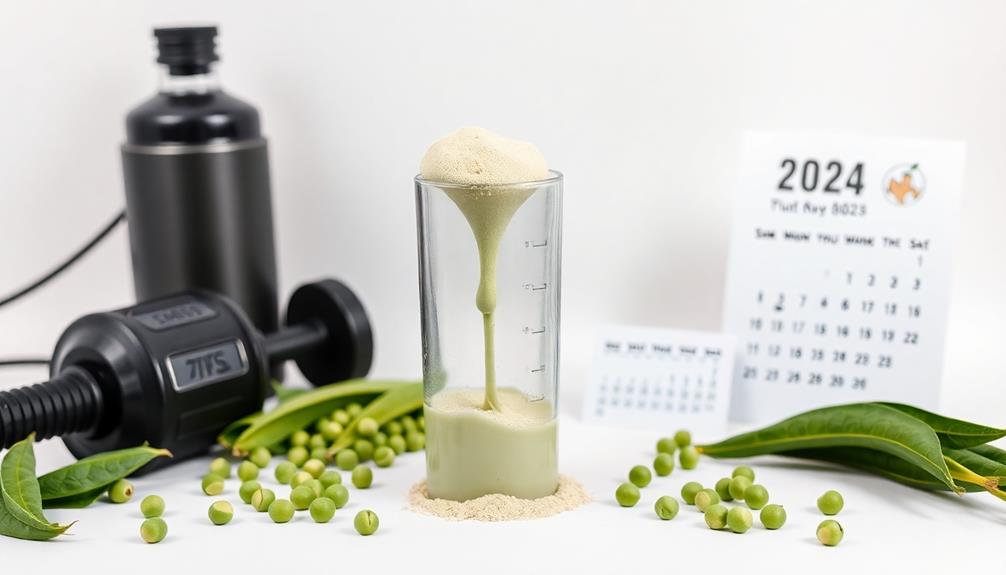Are you tired of sifting through countless protein powder options, wondering which one will best support your plant-based fitness goals? Look no further! These top 5 pea-based protein powders for 2024 offer a range of features to suit every preference and dietary need. From Anthony's Premium Pea Protein's versatile unflavored formula to Micro Ingredients North American Pea Protein Powder's impressive 27g of protein per serving, there's something for everyone. Naked Pea Protein Isolate caters to those watching their sugar intake, while Purely Inspired Plant-Based Protein Powder satisfies organic enthusiasts with its USDA certification. For minimalists, BetterBody Foods Organic Plant Based Protein Powder keeps it simple with just three ingredients. Each powder brings its own unique strengths to the table, so let's explore what sets them apart and find the perfect match for your plant-powered fitness journey.
Key Takeaways
- Anthony's Premium Pea Protein offers high versatility with 8g protein per tablespoon and gentle digestibility.
- Micro Ingredients North American Pea Protein Powder provides 27g protein per serving with a complete amino acid profile.
- Naked Pea Protein Isolate delivers 27g protein per serving from 100% yellow peas, non-GMO and additive-free.
- Purely Inspired Plant-Based Protein Powder is USDA organic, offering 20g protein and 4g fiber per serving.
- BetterBody Foods Organic Plant Based Protein Powder contains 16g complete protein from three organic ingredients per serving.
Anthonys Premium Pea Protein (2 lb, Plant Based, Gluten Free)
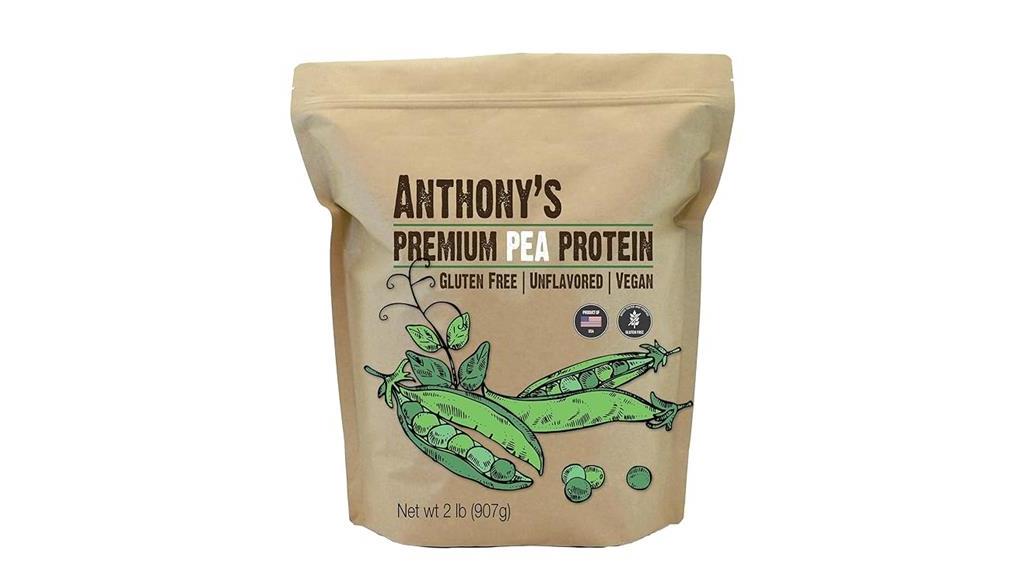
If you're looking for a versatile, plant-based protein powder that's free from common allergens, Anthony's Premium Pea Protein is an excellent choice. This gluten-free, vegan, and keto-friendly option packs a punch with 8g of protein per tablespoon. You'll get over 90 servings in each 2-pound bag, making it a cost-effective addition to your fitness routine.
You can easily incorporate this unflavored powder into your favorite recipes. Whether you're whipping up a protein shake, baking some treats, or adding creaminess to soups, Anthony's Pea Protein has got you covered. It's sourced from Canadian peas and packed in California, ensuring high quality. If you've struggled with bloating from whey proteins, you'll appreciate this gentler alternative. Just remember, you might need to experiment with sweeteners and flavors to find your perfect blend.
Best For: Health-conscious individuals seeking a versatile, plant-based protein powder that's free from common allergens and suitable for various dietary needs.
Pros:
- High protein content with 8g per tablespoon and over 90 servings per bag
- Versatile and unflavored, making it suitable for both sweet and savory recipes
- Gluten-free, vegan, and keto-friendly, catering to multiple dietary restrictions
Cons:
- May require experimentation to achieve desired taste and texture
- Some users report concerns about the product's purity and processing methods
- Unflavored nature might not appeal to those preferring ready-to-drink flavored options
Micro Ingredients North American Pea Protein Powder (5 Pounds)
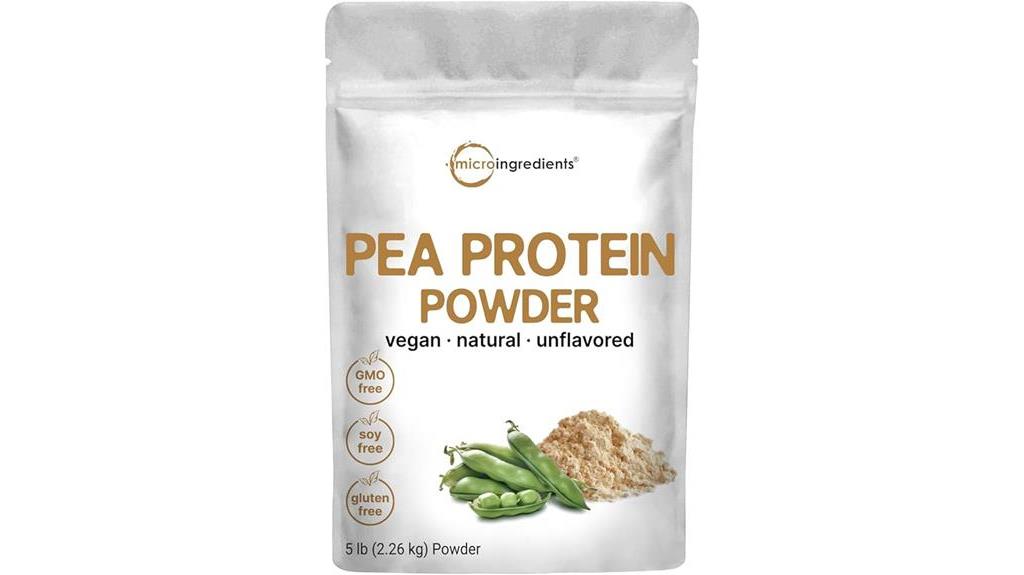
Athletes and fitness enthusiasts seeking a plant-based protein supplement will find Micro Ingredients North American Pea Protein Powder an excellent choice. This 5-pound pouch offers a whopping 68-day supply, packing 27g of protein per serving. It's a complete protein source, rich in BCAAs and EAAs, supporting muscle strength and tissue maintenance. You'll love its versatility in smoothies and baked goods, though you might want to mix it with fruits to mask the flavor. While it's gentle on some stomachs, others report digestive issues, so blend it thoroughly to avoid clumping. At around $7 per pound, it's a cost-effective alternative to whey protein. Just remember, opinions on taste and digestion vary, so you'll need to give it a try to see if it's your perfect protein match!
Best For: Athletes and fitness enthusiasts seeking an affordable, plant-based, complete protein source that's versatile for various recipes and supports muscle strength and tissue maintenance.
Pros:
- High protein content (27g per serving) with a complete amino acid profile
- Cost-effective alternative to whey protein at around $7 per pound
- Versatile for use in smoothies, baked goods, and other recipes
Cons:
- Some users report digestive issues such as bloating and diarrhea
- Taste may be unappealing when consumed alone, requiring additional flavoring
- Can be lumpy if not blended properly, especially when mixed by hand
Naked Pea Protein Isolate (Plant-Based, 15 Servings)
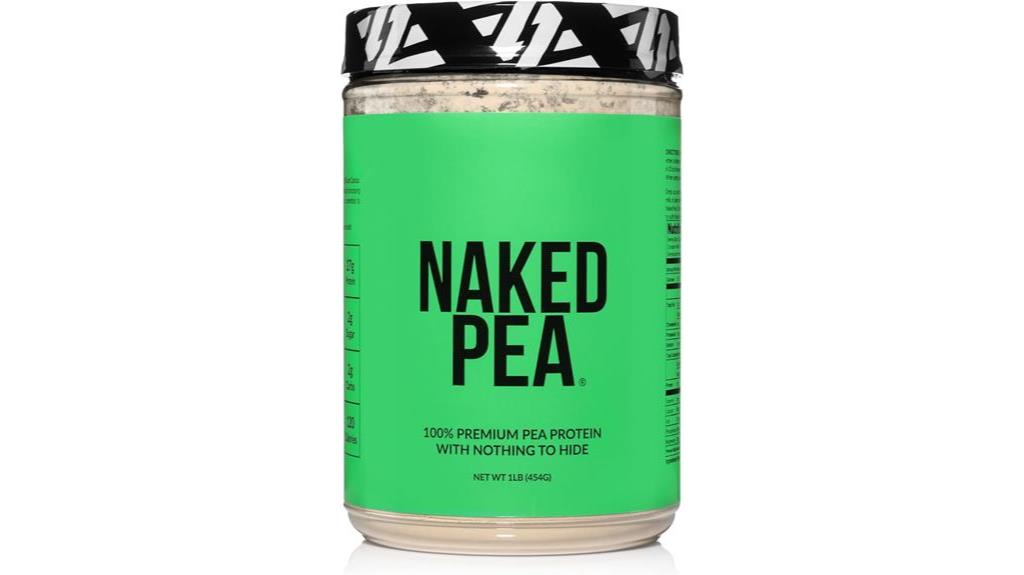
Naked Pea Protein Isolate stands out as an excellent choice for those seeking a clean, plant-based protein supplement. With 27g of protein and just 2g of sugar per serving, it's a powerhouse for your fitness goals. You'll appreciate its simple ingredient list: 100% yellow peas, sourced from eco-friendly farms in North America. It's non-GMO, gluten-free, and free from additives, making it a top pick for health-conscious consumers.
When it comes to taste, you might find it a bit bland on its own. But don't worry! Mix it into smoothies or recipes to mask the flavor. If you're not a fan of the unflavored version, try the vanilla or chocolate options for a tastier experience. While some users note a chalky texture, most find it blends well when prepared properly. Plus, it's gentle on your digestive system, unlike some whey proteins that can cause bloating.
Best For: Health-conscious individuals, vegans, and athletes looking for a clean, plant-based protein supplement with high protein content and minimal additives.
Pros:
- High protein content (27g per serving) with low sugar and carbs
- Clean ingredient list: 100% yellow peas, non-GMO, gluten-free, and additive-free
- Gentle on digestion compared to whey protein alternatives
Cons:
- Bland taste when consumed alone, requiring mixing with other ingredients
- Slightly chalky texture that may not appeal to all users
- Limited availability in some regions, particularly Canada
Purely Inspired Plant-Based Protein Powder, French Vanilla Flavor
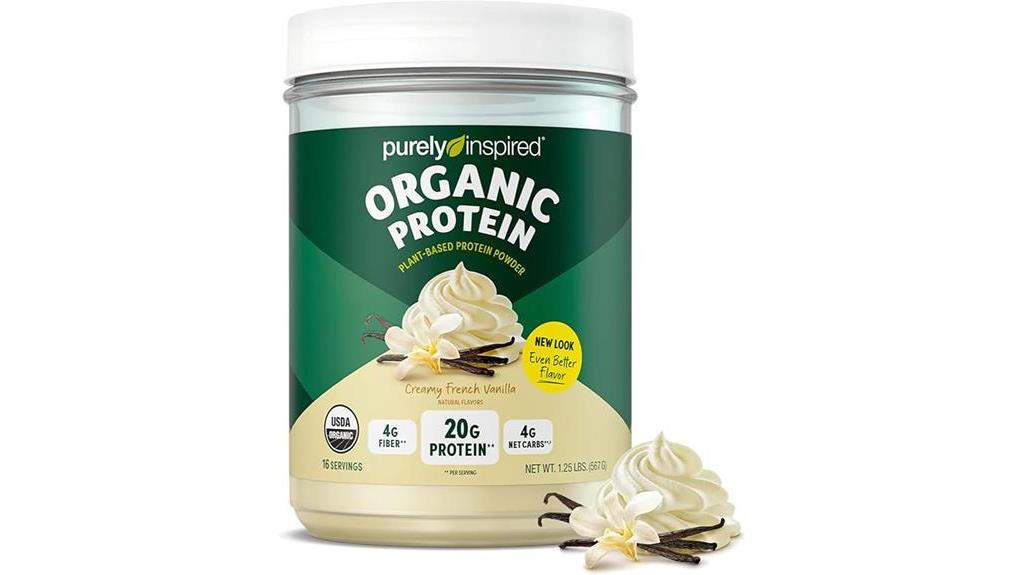
For those seeking a plant-based protein powder that's both nutritious and budget-friendly, Purely Inspired's French Vanilla flavor stands out. You'll get 20g of plant protein per serving, along with 4g of fiber and a healthy dose of iron. It's USDA organic, non-GMO, and free from dairy, gluten, and soy. Plus, it's packed with probiotics and prebiotics for gut health.
When it comes to taste, opinions are mixed. Some love the creamy vanilla flavor, while others find it too sweet or artificial. If you're not a fan, try mixing it with unflavored protein or adding natural sweeteners. It blends easily with water or non-dairy milk, and you can even use it in recipes like oatmeal and pancakes. At around $15 for 18 servings, it's a wallet-friendly option for your fitness journey.
Best For: Health-conscious individuals seeking an affordable, plant-based protein powder with added nutritional benefits like fiber, iron, and probiotics.
Pros:
- Offers 20g of plant protein, 4g of fiber, and iron per serving
- USDA organic, non-GMO, vegan, and free from common allergens
- Economically priced at approximately $15 for 18 servings
Cons:
- Mixed reviews on taste, with some finding it too sweet or artificial
- Potential cross-contamination concerns for those with severe allergies
- May require experimentation to find the right consistency and flavor balance
BetterBody Foods Organic Plant Based Protein Powder
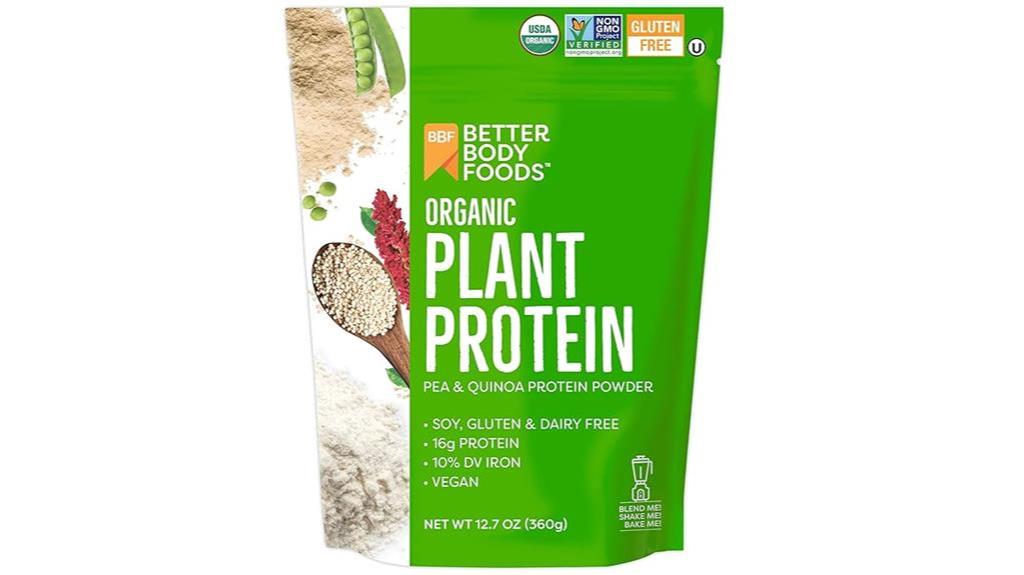
Health-conscious consumers seeking a versatile, plant-based protein option will find BetterBody Foods Organic Plant Based Protein Powder an excellent choice. You'll love its simplicity: just three organic ingredients – pea protein, quinoa powder, and natural flavor – delivering 16 grams of complete protein per serving. It's a clean-label dream, free from gluten, soy, lactose, and GMOs, making it perfect for various dietary needs.
You can easily incorporate this powder into your daily routine. Whether you're whipping up a morning shake, sprinkling it on salads, or baking protein-packed treats, its smooth texture and neutral flavor won't overpower your creations. Plus, with 17 servings per bag, you'll have plenty to experiment with. Users rave about its digestibility and how it enhances the creaminess of smoothies without that chalky aftertaste. It's no wonder health coaches and fitness buffs alike are singing its praises!
Best For: Health-conscious individuals seeking a clean, versatile, and easily digestible plant-based protein powder for their daily nutrition needs.
Pros:
- Clean ingredient list with only three organic components
- Versatile for use in shakes, baking, and various recipes
- Suitable for multiple dietary restrictions (vegan, gluten-free, soy-free)
Cons:
- Requires three scoops per serving, which may be inconvenient for some
- Limited flavor options (only comes in a neutral flavor)
- May be pricier than some non-organic protein powder alternatives
Factors to Consider When Choosing Plant-Based Protein Powders (Pea)
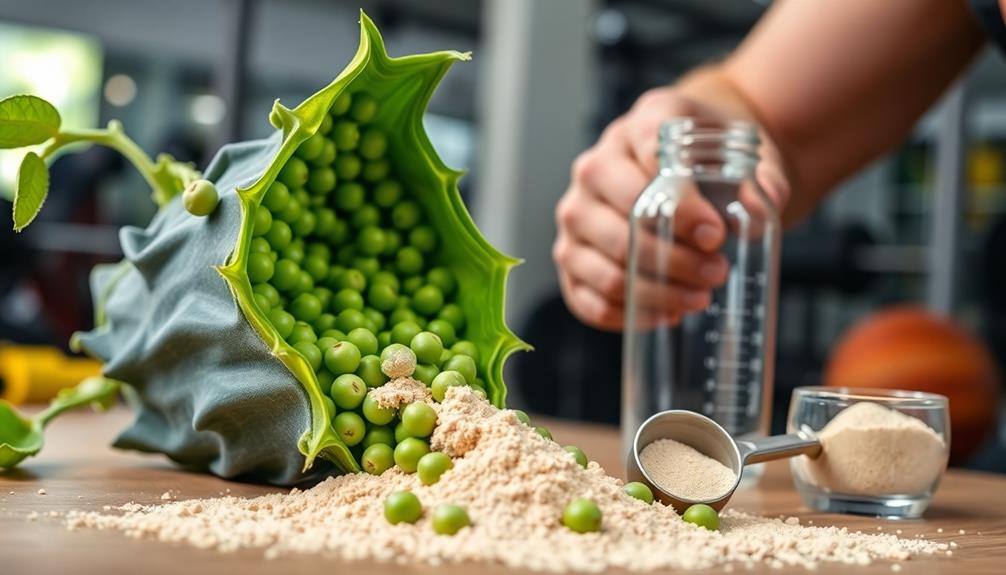
When you're choosing a pea-based protein powder, there's more to contemplate than just the protein content. You'll want to look at factors like ingredient purity, flavor options, mixability, and how well your body can digest it. Let's break down these key points to help you make the best choice for your fitness goals.
Protein Content per Serving
One of the most critical factors to evaluate when selecting a pea-based protein powder is the protein content per serving. You'll find that this can vary widely, typically ranging from 8g to 27g per serving. It's crucial to observe that serving sizes aren't standardized across brands, so you'll need to pay attention to both the protein content and the serving size.
Some products might offer a modest 1 tablespoon (about 15g) serving, while others provide heftier 33g+ portions. Don't be fooled by impressive protein numbers if they're tied to oversized servings! Remember, you can always boost your protein intake by mixing your powder with other protein-rich ingredients. Try adding a dollop of almond butter or a splash of soy milk to create a super-charged shake.
When comparing prices, consider the protein concentration. A $7/lb powder with higher protein content might be a better deal than a cheaper option with less protein per serving. By focusing on protein content, you'll guarantee you're getting the most bang for your buck and the fuel your muscles need for peak performance and recovery.
Ingredient Purity and Sourcing
Beyond protein content, ingredient purity and sourcing are key factors to contemplate when selecting pea-based protein powders. You'll want to look for products that are free from additives, artificial flavors, and fillers. These clean formulations guarantee you're getting the most out of your supplement without any unwanted extras.
When it comes to sourcing, non-GMO peas grown using sustainable farming practices should be your go-to. They're not only better for your health but also for the environment. Don't be shy about digging into where those peas come from – knowing if they're harvested in North America or elsewhere can help you make an informed choice.
Here's a pro tip: Look for certifications like USDA organic and non-GMO. They're like a seal of approval for ingredient quality and sourcing standards. Oh, and don't forget about batch testing! It's essential for confirming your powder is free from gluten and other contaminants, especially if you have dietary restrictions.
Flavor Options Available
Flavor options play an essential role in your choice of pea-based protein powders. You'll find that many brands offer unflavored versions, giving you the freedom to get creative with your recipes. But let's face it, sometimes that natural pea flavor can be a bit… well, pea-like. Don't worry, though! You've got options to make your protein shake a taste sensation.
If you're not in the mood to play mixologist, flavored varieties like vanilla and chocolate are readily available. Just keep in mind that sweetness levels can vary, so you might need to try a few before finding your perfect match. For the adventurous types, unflavored powders are your blank canvas. Mix in fruits, veggies, or even other protein sources to create your own flavor masterpiece. And if you're feeling fancy, why not experiment with nut butters or spices?
Mixability and Texture
When it comes to mixability and texture, pea protein powders can be a bit finicky. You'll find that some brands blend like a dream, while others might leave you with a glass full of lumps. Don't worry, though – we've got some tips to help you achieve that smooth, creamy shake you're after!
First things first: ditch the spoon and grab your blender. While stirring by hand might work for some powders, most pea proteins benefit from a good whirl in the blender. This extra step can make a world of difference, transforming a potentially chalky or sticky mixture into a silky-smooth drink.
Still not loving the texture? Try mixing your pea protein into a larger smoothie. Toss in some fruits and greens – it'll not only improve the overall taste but also help mask any lingering pea flavor. For a change of pace, some brands work wonders in soups, adding a creamy boost without clumping.
Digestibility and Allergens
Now that we've tackled the mixability challenges, let's consider how pea protein affects your body after consumption. You'll be pleased to know that pea protein is generally easy on the digestive system. Unlike its dairy-based counterparts, which can leave you feeling bloated and uncomfortable, pea protein typically causes fewer tummy troubles.
But wait, there's more good news! If you're someone who's constantly dodging food allergens like a nutritional ninja, pea protein might just be your new best friend. It's hypoallergenic, meaning it's less likely to trigger those pesky allergic reactions that soy, dairy, or gluten might cause.
Here's the real kicker: pea protein is a complete protein powerhouse, packing all nine essential amino acids. That's music to the ears of plant-based fitness enthusiasts looking for a balanced protein fix.
Now, don't get too carried away – some folks might still experience a bit of digestive drama. Remember, everyone's body is different. To keep things smooth sailing, try blending your pea protein thoroughly. Your stomach will thank you!
Price and Value
Let's talk money. When you're on the hunt for pea protein powder, you'll typically find prices ranging from $7 to $15 per pound. But don't just grab the cheapest option off the shelf! There's more to evaluate when it comes to getting the best bang for your buck.
First, check out the protein content per serving. Some powders pack a whopping 27g of protein, making them a real bargain for your muscles and wallet. Next, look at the number of servings per package. A bag with 90+ servings might seem pricier upfront, but it'll keep you fueled for longer.
While brands often duke it out on price, don't forget to weigh quality against cost. A slightly pricier powder that's free from fillers and additives might actually be the better deal in the long run. It's like buying a sturdy pair of running shoes – sometimes it pays to invest a little more upfront for better performance down the road.
Certifications and Testing
Seals of approval matter when you're picking a pea protein powder. You'll want to look for certifications that guarantee quality and meet your dietary needs. USDA Organic, Non-GMO, and gluten-free labels are your go-to markers for a high-quality product. But don't stop there!
For those with gluten sensitivities or celiac disease, batch testing for gluten-free certification is essential. It's like having a bouncer at the door, keeping unwanted gluten out of your shake. Third-party testing is another big win – it's like having a nutritional detective verify the powder's purity and nutritional content.
If you're following a vegan lifestyle or have allergies, look for products that are clearly labeled vegan and free from common allergens like soy and dairy. It's like finding a protein powder that speaks your dietary language!
And for the eco-warriors out there, certifications related to environmental sustainability are your new best friends. They're a nod to responsible farming practices, so you can flex your muscles and your environmental conscience at the same time. Remember, these certifications aren't just fancy stickers – they're your guarantee of quality, safety, and values alignment.
Versatility in Recipes
Culinary chameleons, pea protein powders offer a world of recipe possibilities. You'll find these versatile powders can slip seamlessly into your favorite dishes, boosting protein without hijacking flavor. Whether you're whipping up a post-workout smoothie or baking protein-packed muffins, unflavored pea protein is your blank canvas.
Craving a creamy treat? Mix it into yogurt or blend it into a velvety sauce. The mild taste won't compete with your main ingredients, letting you play flavor maestro. Got a sweet tooth? Toss it in with fruits and nuts for homemade energy bites that'll keep you fueled all day.
Plant-based milk lovers, rejoice! Pea protein plays nice with your almond, oat, or soy milk, creating protein-rich shakes that'll make your muscles sing. And for those savory moments, sneak it into soups or sauces for an extra nutritional punch.
Frequently Asked Questions
Can Pea Protein Powder Cause Bloating or Digestive Issues?
You've stumbled upon a common concern! Pea protein powder can indeed cause bloating or digestive issues for some people. If you're sensitive to legumes or consume large amounts, you might experience discomfort. Start with small servings to gauge your tolerance.
How Does Pea Protein Compare to Whey Protein for Muscle Building?
You'll find pea protein comparable to whey for muscle building. It's rich in essential amino acids, especially leucine, which aids muscle growth. While whey's absorption is faster, pea protein's slower digestion can offer sustained benefits.
Are There Any Potential Allergens in Pea Protein Powders?
Like David facing Goliath, you'll find pea protein's a safe bet for most. You're unlikely to encounter allergens, as it's free from common triggers like dairy, soy, and gluten. It's a friendly option for sensitive stomachs.
Can Pea Protein Powder Be Used in Baking or Cooking?
Yes, you can use pea protein powder in baking and cooking. It's versatile and works well in smoothies, pancakes, muffins, and energy bars. You'll boost the protein content of your recipes while maintaining a neutral flavor profile.
Do Pea Protein Powders Contain All Essential Amino Acids?
While you might think all proteins are equal, pea protein surprises. You'll find it contains most essential amino acids, but it's slightly low in methionine. Don't worry though, you can easily complement it with other protein sources.

